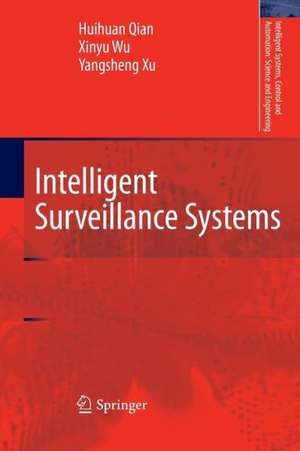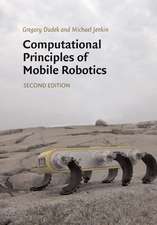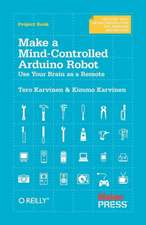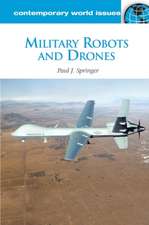Intelligent Surveillance Systems: Intelligent Systems, Control and Automation: Science and Engineering, cartea 51
Autor Huihuan Qian, Xinyu Wu, Yangsheng Xuen Limba Engleză Paperback – 21 apr 2013
| Toate formatele și edițiile | Preț | Express |
|---|---|---|
| Paperback (1) | 640.19 lei 43-57 zile | |
| SPRINGER NETHERLANDS – 21 apr 2013 | 640.19 lei 43-57 zile | |
| Hardback (1) | 645.97 lei 43-57 zile | |
| SPRINGER NETHERLANDS – 23 mar 2011 | 645.97 lei 43-57 zile |
Din seria Intelligent Systems, Control and Automation: Science and Engineering
- 18%
 Preț: 890.23 lei
Preț: 890.23 lei - 24%
 Preț: 672.00 lei
Preț: 672.00 lei - 18%
 Preț: 951.59 lei
Preț: 951.59 lei - 15%
 Preț: 647.27 lei
Preț: 647.27 lei - 15%
 Preț: 644.63 lei
Preț: 644.63 lei - 18%
 Preț: 1246.15 lei
Preț: 1246.15 lei - 18%
 Preț: 1011.45 lei
Preț: 1011.45 lei - 20%
 Preț: 752.66 lei
Preț: 752.66 lei - 18%
 Preț: 1230.66 lei
Preț: 1230.66 lei - 18%
 Preț: 1839.32 lei
Preț: 1839.32 lei - 18%
 Preț: 719.59 lei
Preț: 719.59 lei - 15%
 Preț: 636.12 lei
Preț: 636.12 lei - 18%
 Preț: 1112.15 lei
Preț: 1112.15 lei - 18%
 Preț: 1836.31 lei
Preț: 1836.31 lei - 18%
 Preț: 1236.51 lei
Preț: 1236.51 lei - 20%
 Preț: 988.81 lei
Preț: 988.81 lei - 20%
 Preț: 357.15 lei
Preț: 357.15 lei - 15%
 Preț: 640.71 lei
Preț: 640.71 lei - 18%
 Preț: 1835.83 lei
Preț: 1835.83 lei - 18%
 Preț: 947.98 lei
Preț: 947.98 lei - 18%
 Preț: 962.98 lei
Preț: 962.98 lei - 15%
 Preț: 643.48 lei
Preț: 643.48 lei - 18%
 Preț: 951.47 lei
Preț: 951.47 lei - 18%
 Preț: 950.84 lei
Preț: 950.84 lei - 20%
 Preț: 1924.47 lei
Preț: 1924.47 lei - 15%
 Preț: 644.30 lei
Preț: 644.30 lei - 20%
 Preț: 556.64 lei
Preț: 556.64 lei - 18%
 Preț: 952.72 lei
Preț: 952.72 lei - 18%
 Preț: 953.97 lei
Preț: 953.97 lei - 18%
 Preț: 951.14 lei
Preț: 951.14 lei
Preț: 640.19 lei
Preț vechi: 800.23 lei
-20% Nou
Puncte Express: 960
Preț estimativ în valută:
122.50€ • 128.24$ • 101.36£
122.50€ • 128.24$ • 101.36£
Carte tipărită la comandă
Livrare economică 07-21 aprilie
Preluare comenzi: 021 569.72.76
Specificații
ISBN-13: 9789400735606
ISBN-10: 940073560X
Pagini: 188
Ilustrații: XX, 168 p.
Dimensiuni: 155 x 235 x 10 mm
Greutate: 0.27 kg
Ediția:2011
Editura: SPRINGER NETHERLANDS
Colecția Springer
Seria Intelligent Systems, Control and Automation: Science and Engineering
Locul publicării:Dordrecht, Netherlands
ISBN-10: 940073560X
Pagini: 188
Ilustrații: XX, 168 p.
Dimensiuni: 155 x 235 x 10 mm
Greutate: 0.27 kg
Ediția:2011
Editura: SPRINGER NETHERLANDS
Colecția Springer
Seria Intelligent Systems, Control and Automation: Science and Engineering
Locul publicării:Dordrecht, Netherlands
Public țintă
ResearchCuprins
1 Introduction; 1.1 Background; 1.2 Existing Surveillance Systems; 1.3 Book Contents; 1.4 Conclusion; 2 Background/Foreground Detection; 2.1 Introduction; 2.2 Pattern Classification Method; 2.2.1 Overview of Background Update Methods; 2.2.2 Pattern Classification-based Adaptive Background Update Method; 2.3 Frame Differencing Method; 2.4 Optical Flow Method; 2.5 Conclusion; 3 Segmentation and Tracking; 3.1 Introduction; 3.2 Segmentation; 3.3 Tracking; 3.3.1 Hybrid Tracking Method; 3.3.2 Particle Filter-based Tracking Method; 3.3.3 Local Binary Pattern-based Tracking Method; 3.4 Conclusion; 4 Behavior Analysis of Individuals; 4.1 Introduction; 4.2 Learning-based Behavior Analysis; 4.2.1 Contour-based Feature Analysis; 4.2.2 Motion-based Feature Analysis; 4.3 Rule-based Behavior Analysis; 4.4 Application: Household Surveillance Robot; 4.4.1 System Implementation; 4.4.2 Combined Surveillance with Video and Audio; 4.4.3 Experimental Results; 4.5 Conclusion; 5 Facial Analysis of Individuals; 5.1 Feature Extraction; 5.1.1 Supervised PCA for Feature Generation; 5.1.2 ICA-based Feature Extraction; 5.2 Fusion of SVM Classifiers; 5.3 System and Experiments; 5.3.1 Implementation; 5.3.2 Experiment Result; 5.4 Conclusion; 6 Behavior Analysis of Human Groups; 6.1 Introduction; 6.2 Agent Tracking and Status Analysis; 6.3 Group Analysis; 6.3.1 Queuing; 6.3.2 Gathering and Dispersing; 6.4 Experiments; 6.4.1 Multi-Agent Queuing; 6.4.2 Gathering and Dispersing; 6.5 Conclusion; 7 Static Analysis of Crowds: Human Counting and Distribution; 7.1 Blob-based Human Counting and Distribution; 7.1.1 Overview; 7.1.2 Preprocessing; 7.1.3 Input Selection; 7.1.4 Blob Learning; 7.1.5 Experiments; 7.1.6 Conclusion; 7.2 Feature-based Human Counting andDistribution; 7.2.1 Overview; 7.2.2 Initial Calibration .; 7.2.3 Density Estimation; 7.2.4 Detection of an Abnormal Density Distribution; 7.2.5 Experiment Results; 7.2.6 Conclusion; 8 Dynamic Analysis of Crowd; 8.1 Behavior Analysis of Individuals in Crowds; 8.2 Energy-based Behavior Analysis of Groups in Crowds; 8.2.1 First Video Energy; 8.2.2 Second Video Energy; 8.2.3 Third Video Energy; 8.2.4 Experiment using a Metro Surveillance System; 8.2.5 Experiment Using an ATM Surveillance System; 8.3 RANSAC-based Behavior Analysis of Groups in Crowds; 8.3.1 Random Sample Consensus (RANSAC); 8.3.2 Estimation of Crowd Flow Direction; 8.3.3 Definition of a Group in a Crowd (Crowd Group); 8.3.4 Experiment and Discussion; References; Index.
Textul de pe ultima copertă
Surveillance systems have become increasingly popular. Full involvement of human operators has led to shortcomings, e.g. high labor cost, limited capability for multiple screens, inconsistency in long-duration, etc. Intelligent surveillance systems (ISSs) can supplement or even replace traditional ones. In ISSs, computer vision, pattern recognition, and artificial intelligence technologies are used to identify abnormal behaviours in videos. They present the development of real-time behaviour-based intelligent surveillance systems. The book focuses on the detection of individual abnormal behaviour based on learning and the analysis of dangerous crowd behaviour based on texture and optical flow. Practical systems include a real-time face classification and counting system, a surveillance robot system that utilizes video and audio information for intelligent interaction, and a robust person counting system for crowded environments.
Caracteristici
explains practical applications for ISS in an easily-accessible way; presents the newest results on Intelligent Surveillance Systems; includes dynamics analysis for crowd behaviour. Includes supplementary material: sn.pub/extras











